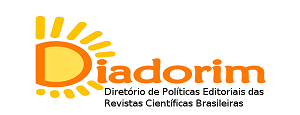POST-FUNCTIONAL INTERPRETATIONS OF SPACE IN POSTGRADUATION IN GEOGRAPHY
CONTRIBUTIONS TO INTEGRATED HUMAN GEOGRAPHY
DOI:
https://doi.org/10.20873/rtg.v11n23p01-17Keywords:
Postgraduation, Human Geography, SpaceAbstract
The present work seeks to rethink the epistemic bases of human geography as a production of meaning/teacher knowledge, from the experience of continuing education, presents as a possibility an integrated human geography, built on a joint material-phenomenic view of its object of analysis, the space. We base our discussion, in addition to a bibliographic review, on reports of contributions from professors from the Graduate Program in Geography at the Federal University of Amazonas (UFAM), contributions made in two respective lessons, within the scope of the course "Epistemology of Geography" of the course in 2018, characterizing this research as bibliographical and narrative/qualitative in presenting life stories. These professors are Dr. Amélia Nogueira, who contributed with an expository class on phenomenology in Geography, and Dr. José Aldemir [in memoriam], who presented Henri Lefebvre triadic theory of space. Enabling us to interpret an integrated human geography as teaching knowledge, to the detriment of the traditional split of geography, so common in Postgraduate Programs at Masters and Doctoral level. The classical division between physical and human geography is also in process in human geography itself, with the flourishing of humanistic geography and / or cultural. The aim is, based on the reports of experiences/knowledge, to overcome this vice in fragmenting Geography, highlighting the importance of understanding space in totality, a complex whole, contributing to the formation of Geography professors-researchers in totality, since geographic knowledge must be built on the principle of complexity.
References
CABRAL. G, R.; BASTOS. R, S. Ser professor, saberes docentes e fazer pedagógico: constituição da identidade docente a partir da formação continuada. In: MORETTO. M. (Org.). Discussões sobre a formação docente: da inicial à continuada. (Coleção educação, volume 2) – Jundiaí [SP]: Paco editorial, 2019. p. 23-42.
CLAVAL. P. A revolução pós-funcionalista e as concepções atuais da geografia. In: MENDONÇA. F.; KOZEL. S. (Org.). Elementos de epistemologia da geografia contemporânea. [revisão de texto Maria José Fernandes Naime]. – [Curitiba] : Ed. da UFPR, 2002, Reimpressão 2004. p. 11-43.
DARDEL. E. O homem e a terra: natureza da realidade geográfica. Tradução: Werther Holzer. – São Paulo: Perspectiva, 2011.
LIMA. M, G, S, B. Autobiografias de professores e formação: releitura de uma tese. In: MENDES SOBRINHO. J, A, C.; LIMA. M, G, S, B. (Org.). Formação, prática pedagógica e pesquisa em educação: retratos e relatos. – Teresina: EDUFPI, 2011. p. 33-53.
MARX. K. Contribuição à crítica da economia política. Tradução e introdução de Florestan Fernandes. – 2. Ed. – São Paulo : Expressão popular, 2008.
MARX.K.; ENGELS. F. A ideologia alemã. Tradução de Álvaro de Pina. -1. ed. – São Paulo : Expressão Popular, 2009.
MERLEAU-PONTY. M. Fenomenologia da percepção. [tradução Carlos Alberto Ribeiro de Moura]. – 2 – ed. – São Paulo : Martins Fontes, 1999.
MINAYO. M, C, S. O desafio da pesquisa social. In: MINAYO. M, C, S.; DESLANDES. S, F.; GOMES. R. (Org.). Pesquisa social: teoria, método e criatividade. – Petrópolis, RJ : Vozes, 2016. p. 9-28.
MOREIRA. R. O que é geografia. São Paulo: Brasiliense. – (Coleção Primeiros Passos: 48), 8ª reimp. 14ª edição, 2006.
MORIN. E. Os sete saberes necessários à educação do futuro. Tradução de Catarina Eleonora f. da Silva e Jeanne Sawaya; revisão técnica de Edgard de Assis Carvalho. – 5. ed. – São Paulo : Cortez ; Brasília, DF : UNESCO, 2002.
NÓBREGA. T, P. Corpo, percepção e conhecimento em Merleau-Ponty. Estudos de Psicologia, 2008, 13(2), 141-148.
NOGUEIRA. A, R, B. Uma interpretação fenomenológica na geografia. In: Anais do X Encontro de Geógrafos da América Latina – 20 a 26 de março de 2005 – Universidade de São Paulo (USP), São Paulo-SP. p. 10243-10262.
SANTOS, M. Por uma geografia nova: da crítica da geografia a uma geografia crítica. – 3ª Ed. Editora Hucitec, São Paulo, 1990.
SCHMID. C. A teoria da produção do espaço de Henri Lefebvre: em direção a uma dialética tridimensional. Tradução: Marta Inês Medeiros Marques e Marcelo Barreto. GEOUSP – espaço e tempo, São Paulo, nº 32, p. 89 – 109, 2012.
Downloads
Published
How to Cite
Issue
Section
License
Revista Tocantinense de Geografia does not remunerate any author for the publication of their texts. The contents of the texts published in this journal are the responsibility of the authors.








.png)












